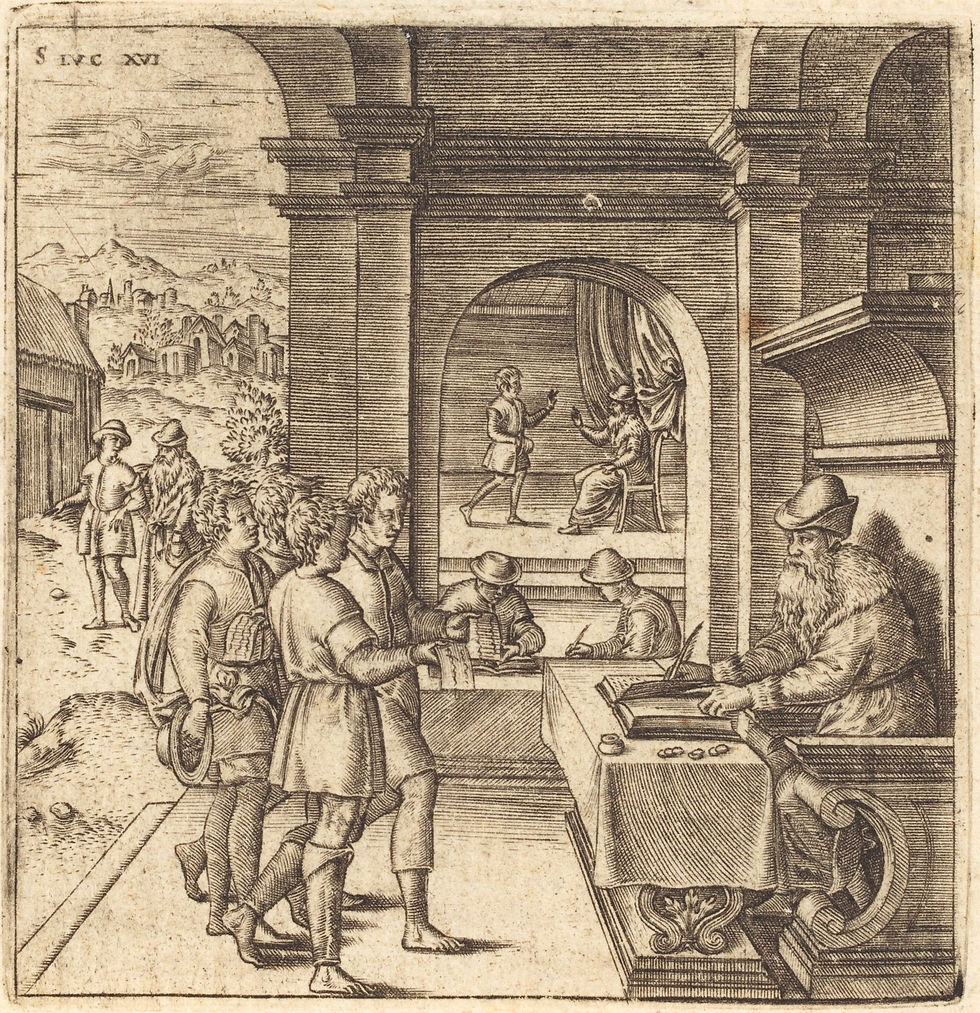Twenty-Fifth Sunday in Ordinary Time, Year C (2025) - Fr Matthew Boland, OP
- Dominican Friars

- Sep 19, 2025
- 4 min read
Today’s parable might strike us as somewhat bizarre. It seems to present a dishonest steward as someone to imitate. This is despite the fact that he’s been caught ripping his master off (for which reason he’s going to be sacked), and then proceeds to cook the books for personal gain, embezzling his master’s property. In a final bizarre twist, the master praises him, or at least, the astuteness of his actions. How should we understand this strange parable?
First of all, it’s helpful to note that Jesus occasionally tells stories and parables which depict morally questionable characters and behaviours. In other parables, we hear about violent and jealous kings and curmudgeonly old judges. Jesus even says that when he comes again, he will come like a thief. Of course, he doesn’t mean that he will come to rob us! Rather, he means that he will come at a time we don’t expect. In each of these cases, there are aspects of the image employed which we should ignore, and others which we should imitate, or attribute to God. Putting aside, then, the immoral aspects of the steward’s behaviour, what is there in his example that we should imitate?
The first thing we can admire about the steward is that he recognises a crisis point coming up in his life. He’s not simply living in the present, absorbed in mundane things. Rather, he’s thinking and planning about the future. In the parable, he is about to be sacked—there’s a crisis coming up. Reading the parable allegorically, what is the big crisis we all face? One way of understanding this is as the crisis we all face of leaving this life. The crisis of death. This is the big crisis point, the inevitable transition, that is coming up in our future, in everybody’s future. We should imitate the steward in recognising this, and planning for it.
Understanding this transition point allegorically as the moment of death can also help us to interpret what the steward means when he says that, when this time comes, he will be too weak to do physical labour, and too ashamed to beg. We can understand physical labour to refer to the charitable works we have the opportunity to do in this life (such as those found in the seven corporal works of mercy: feed the hungry, shelter the homeless, visit the sick, etc.). The time will come when we no longer have this opportunity to do these good works. By begging, we can understand petitionary prayer; that is, prayer in which we ask God for the grace we need to do his will in this life, and ask the angels and saints for their intercession. The opportunity to do this will also cease at the end of our life. The steward understands that the time is coming when the opportunity for work and begging will be over. Similarly, we should understand that, when we leave this life, the opportunity to do good works, and the time for petitionary prayer, will come to an end. In other words, the time for good works and prayers is now.

This leads us to the second admirable characteristic of the steward. He doesn’t just recognise his precarious position and the impending crisis; he does something about it. He uses his master’s property, of which he is the steward, to make friends who will care for him in the future. In a similar way, we should use what we have to make friends who will welcome us into the next life. Everything we have comes from God, so, like the character in the story, we are simply stewards of what we have. The Fathers of the Church understood this to mean that we should use our resources to make friends with the poor and needy in this life through our good works and almsgiving. These friends will then welcome us into eternity. As Jesus says, “Use money, tainted as it is, to win you friends, and thus make sure that when it fails you [that is, when we die], they will welcome you into the tents of eternity.”
Brothers and sisters, today’s parable places before us that awful moment when we will cross to the other side. However, this should not cause in us a morbid and defeatist attitude towards death. Rather, it should inspire in us a sense of urgency, a sense of opportunity, to use the gifts and possessions we have been given by God in this life to merit, by grace, eternal life. This life is our one chance to use what we have been given by God, which still belongs to him, to build up our treasure in heaven.
Let us, then, follow the example of the dishonest steward and take action now. Let us ask, beg, God for the grace we need to do his will in this life, and let us use our God-given gifts and possessions to show the love of Christ to our neighbour. Then, when that momentous final moment arrives, we will have the greatest joy to hear those words of our Lord, “Well done, good and faithful servant; you have been faithful over a little, I will set you over much; enter into the joy of your Master.”

Fr Matthew Boland, OP is the Master of Students, assigned to St Dominic's Priory, Melbourne.




Comments